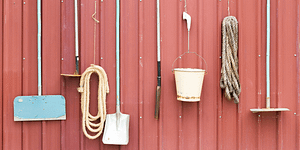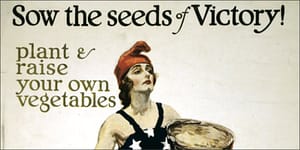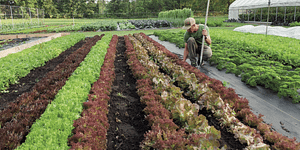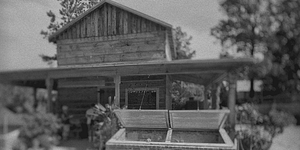The Permaculture Way—Tending Your Personal Garden

An integral aspect of Permaculture—”an approach to designing human settlements and perennial agricultural systems that mimic the relationships found in the natural ecologies”—is the realization that all things are connected.
Finding peace in the harmonious systems of your garden is a good entry point for plugging into the interconnectedness of all systems on Earth.
The following is an excerpt from The Permaculture Way: Practical Steps to Create a Self-Sustaining World by Graham Bell. It has been adapted for the Web.
What Is Wrong With Present Practice
The power of human creativity has outstripped our ability to govern, or even know, the results of our actions. World governments, often the blindest form of life, have noticed something is wrong. ‘Help! The world is polluted!’ They are forming commissions daily, to study it.
Politicians face a rising gale of Green awareness, claiming never to have worried about anything else. ‘Our policies have always regarded the environment as our most important asset’.
‘Hurrah!’ we say, and ask: ‘What are you doing about it?’ Ominous silence, or a crackdown on litter louts. The biggest litter louts are, of course, the companies who use disposable packaging.
Are the voters reassured? It appears they’re worried too.
‘Slightly less dirty everything’ from petrol to toothpaste is selling in western supermarkets as if we consumers could save the environment by being a little cleaner in our wasteful habits. These are small steps in the right direction, but they are not solutions.
And it’s not just the capitalist West that’s affected. Citizens of Eastern Europe feel concerned and powerless in the face of overwhelming environmental degradation.
The phrase ‘like there’s no tomorrow’ springs to mind and takes on an ominous significance.
Myself, I am concerned every time I empty a bowl of washing-up water down the sink. Could I have used it better? When will I turn on the tap and find filth, or nothing at all? What a waste! How worrying. What can I do?
Our society is based on the assumption that the ownership of property is desirable. It is materialist and also consumerist. This is the tendency to consume and discard essentials and luxuries.
It comes from a belief that it is a desirable object in life to have a ‘better standard of living’. In a consumerist society standard of living is associated with disposable income.
Is this the best measure to use?
After all, there is no formula for determining how happy people are. Is there? Attempts to form numerical models to measure how healthy people are have been received with great lack of interest or active mistrust by politicians.
In 1980 the British government suppressed the Black report, which had been commissioned by Parliament, and showed that poverty causes ill-health. The arithmetic of money remains the only intelligible standard of what people need as far as politicians are concerned.
Ethically concerned people have always challenged the ‘values’ of monetary wealth and asserted the need to find a ‘higher’ non-disposable purpose to life.
It is individuals who have values, not society itself.
In tending my personal garden (in the figurative and literal senses) I do that which is immediate and within my control. This is the first and essential step to worldwide rejuvenation of natural justice…accepting responsibility for making your life harmonious with the needs of the planet.
The Earth has the ultimate power to cleanse itself of tiresome infestations. You do not need to be a worshipper of some mystical ‘Earth Mother’ to believe this.
Our global home can be God created if you wish, but it still has all the charms and inevitable habits of a living organism, and as such it has its own immune system to eradicate threats to its survival.
As James Lovelock points out in Gaia, how else could life have survived on planet Earth for 3500 million years, ‘against all the odds?’
Respect for the planetary ecology is ancient.
Our present materialistic/consumerist fetish is a mere sneeze in the deep breathing of time. So we see that the term ‘alternative’ is outfought by the very history of ecological awareness. This book is not about an alternative, but about that which is appropriate.
We can return to managing our massive knowledge and capability for construction, not destruction, in a way which accords with natural processes. I do not suppose any previous golden era to which we should all return, nor that we should reject out of hand modern technology.
However, there are plenty of old ideas worth assimilating into our lives, alongside useful current discoveries. The future is what we make it. The only certainty is that things will always change.
Resource Destruction
Although no climatologist can say that ‘this year’ displays the symptoms of the greenhouse effect any more than any other, one thing is clear. . .everywhere, throughout the world, people are experiencing extraordinary climatic conditions.
Soil erosion is accelerating. Forests are being destroyed wholesale and deserts are growing.
We have increasingly poisoned water supplies owing to the excesses of an agricultural system dependent on chemical inputs in the rich parts of the world, and increasingly scarce or salted water supplies in the poor parts.
To ignore the risk and wait for more famine, pestilence, drought, storm, or civil conflict caused by any of these, to drive us to seek better ways of doing the business of living would be foolish.
The world news tells us that if we seek now for co-operative and creative strategies that liberate people and planet, we may be in time. Any delay increases the risk that change will come too late.
How Permaculture Offers an Ethical Approach
At different times in history people have formulated many ethical approaches to life. I live in a Christian culture, which I respect, yet I can also find strength in Buddhist or Taoist literature.
I believe that all religions and codes of conduct stem from the needs of people at given times and places. One of the great beauties of the Islamic culture is that it is not a religion, it is a way of life.
In Christian Europe our understanding of mathematics, geometry and astronomy, and consequently our ability to build and navigate, were greatly enhanced by absorbing scholarship from the great thinkers of Islam.
Science, beauty and God could never be perceived as separate, but as different aspects of the unknowable infinite.
Permaculture is not a cult or religion it is a system for designing which can be adapted to any culture or place, but it asks you to see yourself as one with the universe, and to measure its wonder for your mutual benefit.
You and the rest of creation have the same interest at heart survival — so you should look after each other. Looking after yourself first has a ring of,selfishness’ about it, yet it can be a highly ethical approach.
This understanding of connectedness indicates that whatever you do to the world you affect every other aspect of life to some degree. Fritjof Capra (The Tao of Physics) tells us how physicists have discovered that simply measuring one particle of energy causes instant changes to another, possibly millions of light years apart.
The act of measuring alone has been proved to cause physical changes.
The ethic is to do nothing unless we have to, and to read the consequences of all our actions.
An appealing aspect of Permaculture is that it might be the basis for agreement amongst ordinary people the world over that they have a common goal, and that this makes a good basis (and prerequisite) for world peace. But why do we need ethics at all?
Conflict and strife are the result of more and more people fighting over fewer and fewer resources.
Fighting is not only painful and bad for the health of individuals and nations, it is also a one-way trade — massive resources are wasted in pursuing the conflict, and there is no end product to pay the bill.
The yield of other productive processes (agriculture, industry, wage labour) has to be diverted to fund war. Agreement on a common code of conduct, which we call ethical, can avert this wastage.
People today are increasingly aware that our present wasteful ways are threatening not only our planet’s beauty; but the fundamental natural systems that make our planet work.
The standard of living to which we are accustomed cannot be maintained.
Millions of people in the developing world stand little real chance of ever achieving Western standards of living. To do so would involve a mind-boggling expenditure of non-renewable resources.
There are women whose lives are consumed in endless journeys in search of water or firewood. There are children whose rosiest prospect is carrying a rifle in the wars which have lasted all their lives.
Permaculture is possible under any culture, in any climate, by people with any skills.
The real danger in the rich North is that we will not get productive food, energy and fibre systems in place before the poor people of the South stop us bleeding them dry. In this case we are facing anarchy, disease and starvation in the industrialised world. No amount of ‘democratic’ history will save us.
Recommended Reads
Agroforestry Versus Permaculture: Which Approach to Use for a Community Food Forest
Recent Articles
Interested in micro-farming, but don’t know where to begin? Believe it or not, you only need 9 tools to get started. These easy-to-find tools for micro-farming will set the stage for productive growing! The following is an excerpt from The Lean Micro Farm by Ben Hartman. It has been adapted for the web. Unless otherwise noted, all…
Read MoreSeeds are the foundation of agriculture. As John Navazio describes in this excerpt, America was once home to hundreds of small-scale agricultural seed producers, each of which developed seeds adapted to grow best in the surrounding region. Today, following the trend of most businesses, just a few large companies provide seed for farmers everywhere. With…
Read MoreLooking for a veggie to grow and harvest through winter? Try leeks! With some careful planning, a bit of elbow grease, and some insight from Eliot Coleman, you’ll enjoy leeks from your garden all year long. The following is an excerpt fromThe Winter Harvest Handbook by Eliot Coleman. It has been adapted for the…
Read MoreWant to set up your own micro-farm? These tips will help you learn how to simplify your work, increase profitability, and shape your ideas so you can create the perfect tiny farm for you. The following is an excerpt from The Lean Micro Farm by Ben Hartman. It has been adapted for the web. Unless…
Read MoreExtend your planting season with a cold frame! Building your own cold frame is a simple way to keep growing plants all winter long. The following is an excerpt from Four-Season Harvest by Eliot Coleman. It has been adapted for the web. What Is A Cold Frame? Gardeners should dedicate a monument to the cold…
Read More







